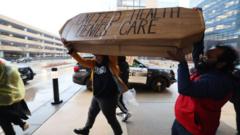The "brazen and targeted" murder of UnitedHealthcare CEO Brian Thompson in New York City has sent shockwaves throughout the United States, drawing attention to the entrenched frustrations within the healthcare system. The violence appears not only connected to Thompson as an individual but also to the broader discontent with a trillion-dollar industry that many perceive as failing the very people it is supposed to help.
While "prior authorization"—a process requiring insurers to approve treatments before coverage—is a technical term seldom associated with public passion, it sparked significant protest this past July. Over 100 individuals gathered outside UnitedHealthcare's headquarters in Minnesota, voicing their grievances against the company for denying claims. Eleven attendees were arrested during the demonstration organized by the People's Action Institute, highlighting the anger directed toward such tactics, which many believe compromise patient care.
Thompson's brutal assassination, shrouded in mystery with ongoing investigations into the motivations behind it, has brought the focus back to the frustrations associated with denials and high out-of-pocket costs. Messages incised on shell casings discovered at the crime scene, including the words "deny," "defend," and "depose," may be interpreted as a deeper indictment of insurance practices that prioritize profitability over patient welfare.
Reflecting on Thompson's LinkedIn profile, one can find numerous sentiments echoing outrage. Commenters, some grappled with medical crises aggravated by insurance denials, expressed their dissatisfaction openly. One notable response came from a woman battling stage 4 cancer, who recounted the cycle of denials she faced. His wife, Paulette Thompson, disclosed to NBC that he had received threatening messages prior to his death, ostensibly linked to the contentious nature of his profession.
As industry insiders and politicians mourned Thompson's loss, contrasting reactions emerged from the public. Social media buzzed with a mix of sympathy, dark humor, and outright vitriol directed at the insurance industry. The remarks spanned the political spectrum, pointing to a unifying dissatisfaction over healthcare struggles, from the left-wing critics of corporate greed to right-leaning activists wary of government-established monopolies.
Unai Montes-Irueste of the People's Action Institute highlighted the pervasive bitterness among Americans grappling with a dysfunctional healthcare system. He emphasized that “strong feelings” arise when constituents confront the harsh realities of an intricate and fragmented medical landscape. Experts and advocates alike noted the overwhelming complexities individuals encounter when navigating insurance, with only a minority successfully disputing billing errors or denied claims.
Recent research by the Commonwealth Fund illustrates the stark realities faced by working-age insured individuals, with 45% reporting unexpected charges for services they believed should be covered. Compounding this economic strain is a staggering medical debt crisis, unique to the US, whereby many fear bill payments and ultimately face daunting financial burdens due to medical costs.
The ongoing scrutiny of insurance companies underscores pressing concerns over practices such as increased denial rates for treatments and the rising number of uninsured Americans. The case of UnitedHealthcare, which has faced multiple lawsuits and criticism over its denial processes, exemplifies a broader pattern affecting stakeholders nationwide. Health policy experts stress the need to reform insurance practices to bring justice to millions experiencing healthcare-related distress.
As investigations into Thompson’s killing unfold, it becomes ever more apparent that the landscape of healthcare in America has reached a breaking point, necessitating urgent dialogue and reevaluation of the prevailing systems in place.




















